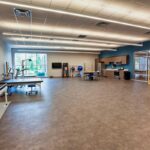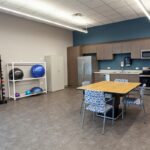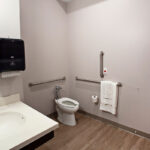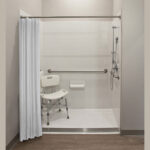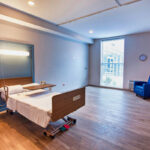 There’s no place like home, until a loved one suffering from advancing stages of Alzheimer’s or other forms of dementia requires more care than family members can provide. Then, there’s no place like Thrive Memory Care of Lake County, where professionally trained staff and proven programs benefit both residents and their families.
There’s no place like home, until a loved one suffering from advancing stages of Alzheimer’s or other forms of dementia requires more care than family members can provide. Then, there’s no place like Thrive Memory Care of Lake County, where professionally trained staff and proven programs benefit both residents and their families.
Thrive is one of 21 JCAHO-certified, dedicated memory care facilities in the U.S., out of the nearly 9,000 listed memory communities, and it is only one of a handful that specialize in long- and short-term care for both dementia and Alzheimer’s residents. Thrive’s memory care program is considered the gold-standard in memory care, having earned both accreditation and certification.
Getting to Know You
What makes Thrive unique is its resident-centered approach to helping residents maintain cognition for as long as possible.
Every resident undergoes a series of cognitive assessments upon admission, given by Thrive therapists to determine where they are in the disease process and to evaluate balance and mobility for safety. “While all memory care residents have some degree of dementia, Alzheimer’s is the most prevalent form,” explains Memory Care Director Vicki Rogers, CDP.
“Therapist-led evaluations upon admission for all residents are unique to Thrive,” adds Rogers. “Because of reimbursement issues most places don’t have therapists perform evaluations. We see establishing a good functional baseline when residents move in as critical, otherwise we may miss early declines. We frequently receive comments from family members of residents who transfer in from other facilities, ‘We had more communication with you in the first week than we did with staff from the other facility during the entire stay.’ ”
In addition to cognitive and physical assessments, Thrive representatives conduct in-depth family interviews and collect family photos. They gather as much information about residents as possible to create a special LifeBio, which gives staff members information to help them relate to their residents’ pasts since many residents do not function in the present.
“The residents aren’t in a position to learn new skills, so we have to adjust our environment to match their abilities. A lot of assisted living and skilled nursing facilities that do not specialize in memory don’t understand this perspective. They expect residents to adapt to their environment.” — Debbie Kayler, OTR/L, Director of Therapy
An interdisciplinary team comprised of therapists, nurses, the unit director, and events coordinator, determine a personalized care plan based on assessment results as well as family interviews. Everything, including the residents’ usual wake up times, and favorite foods are taken into consideration.
“The whole point of dementia care is to figure out where a resident is functioning,” says Director of Therapy Debbie Kayler, OTR/L. “The residents aren’t in a position to learn new skills, so we have to adjust our environment to match their abilities.
“A lot of assisted living and skilled nursing facilities that do not specialize in memory don’t understand this perspective. They expect residents to adapt to their environment.”
“Our skill set is being able to identify what residents can still do and enable them to do it for as long as they can,” adds Rogers. “And, once we know where they are at cognitively, we can place them in group activities with others who are at the same level.”
Form Meets Function
Thrive Memory Care is designed physically and functionally to promote safety and minimize overstimulation and confusion, while maintaining a relaxed, peaceful ambiance. The biometrically secure facility is built in a square, so there are no dead ends for residents who tend to wander. The soothing interior features natural lighting, neutral colors and reduced background noise. Cognitive and visual cues on the doors and walls help residents find their way and identify their individual rooms. Residents’ deluxe shared suites feel more like residential bedrooms, with larger beds, flat-screen televisions and en-suite bathrooms.
One very special visual cue on residents’ doors is a memory box to help them identify where they live and give staff information to converse. “Our activities staff members work with residents and their families to help them design and fill their memory boxes,” says Kayler. “Each box is unique and contains items representing things from past travels, hobbies and events, to help residents identify their rooms.”
Giving Families Peace of Mind
Thrive’s commitment to patient care is on full display through its multi-faceted, patient-centered memory care program. The main components of Thrive’s program include:
- Continuity of care. Staff members are Thrive employees, not contractors, with an average tenure of eight years working together.
- A learning culture. All Memory staff, including cleaning and maintenance crews are required to take a minimum of 12-hours of dementia training annually. Training helps staff connect with residents based on their needs and abilities.
- Engagement. Residents receive recreational and occupational therapy, sensory stimulation and meaningful activities matched to their abilities, enabling them to enjoy purpose and success each day.
- Hugs not drugs. Emphasis on nonpharmacological interventions by determining root cause of behavioral changes is first and foremost. Many facilities use psychotropic medication to manage unwanted behavior. “We try to understand and address the cause of the behavior changes,” says Kayler.
- Family time. Family-style dining with extra meals* available for visiting families, family tea times (On-hold due to COVID), and support groups are just a few of the many programs offered pre-COVID. The team looks forward to safely engaging with residents in these activities as COVID restrictions begin to ease.
“Everything we do is to help focus on possibilities, not on disabilities,” says Kayler. “Our goal is to improve quality of life for both patients and families.”
Thrive of Lake County is located at 850 US Highway 45, Mundelein, Illinois 60060. You can reach out to the office of Thrive of Lake County via phone at (847) 377-7200.
*These activities and services are on hiatus due to the pandemic.












